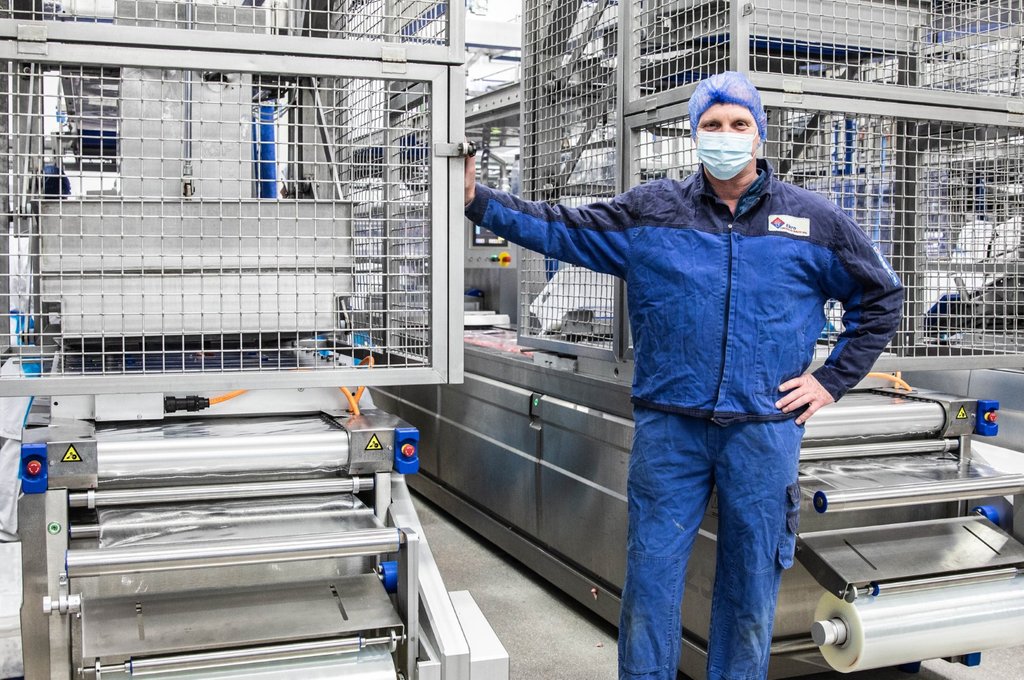Anjo is responsible for Ekro's current machinery as the Technical Service Foreman. Christian Scholten is constantly working on innovation projects in the broadest sense of the word in Ekro's Project Office with four other colleagues. Both men recently collaborated on a large investment project in Ekro's packaging department.
Christian Scholten explains: “What makes Ekro unique is the level of quality it delivers. Ekro has been committed to traceability for several decades. The various departments are equipped with high-tech hardware and software which are seamlessly integrated and guarantee full 'tracking & tracing' of the products. This allows customers to easily obtain all the available information about the meat.”
In addition to the tracking and tracing system, packaging machines are also an important focus for the two colleagues. Good packaging is essential for ensuring food safety and long shelf life. Ekro had been using the same thermoformer for organ meat packaging since 1999. This machine, the RE3, was purchased from another Dutch family business, Repak B.V. in Emmen.
What makes Ekro unique is the level of quality it delivers. Ekro has been committed to traceability for several decades - Christian Scholten
Christian and Anjo recount a nice anecdote about the installation of the RE3. The machine was delivered by truck and then wheeled to its final destination in one piece. However, there suddenly appeared to be a wall in its path, which had not been there when the machine was first purchased. Two colleagues were quickly called in from Emmen to help disassemble the RE3 and reassemble it in the right place, so that it could still be installed over the weekend. The line has been running 16 hours a day since 1999. It is cleaned every evening and serviced twice a year. Anjo Kaatman: “The RE3 had actually been running without any problems in our challenging production environment right up until the end of 2021.”
The RE-series thermoformers are still being manufactured in Emmen, but since 2007, they have been marketed in the Benelux under the brand name SEALPAC. The advice, sales and maintenance are done by Ultrapak B.V. in Nijkerk.
Because the RE3 had been in use for over 20 years by 2020, and a number of other lines were in need of an overhaul, the inevitable question of replacement arose. A major project was initiated within Ekro to explore the various options. Overhauling the existing machines was still an option, but in the end, replacement turned out to offer the greatest benefits. Since Ekro has been working with Repak B.V. and Ultrapak B.V. to its complete satisfaction for many years, the logical choice was soon made to continue the collaboration by purchasing four new thermoformers from them; one RE30 tandem machine for the packaging of by-products and three RE25 machines for the packaging of fresh veal in various weights and sizes. Anjo Kaatman: “The first two machines were installed in September 2021, followed by the last two in November. In both cases, it took place over the weekend and the machines were ready for production on Monday morning at 6.00 am. Exactly what we have come to expect from Ultrapak!”
The RE25 thermoformers are used to pack semi-finished products that are mainly destined for catering and other wholesalers. The primary function of the packaging is to provide protection, so a flexible film suffices and it is actually the most durable. By using vacuum technology an optimal shelf life is achieved. The use of plastic is also reduced. Christian Scholten: “If we look at the vacuum packaging as it is done on our machines, we are actually already down to the bare minimum of packaging. Thanks to the Rapid Air Forming concept, which comes as standard on the machines, shorter vacuum and aeration times are achieved. We can, therefore, be confident of using less material, because of the application of thinner films, lower energy consumption and, ultimately, a more sustainable production process.” Food safety and sustainability go hand in hand here, as the colleagues can confirm with a look of satisfaction.
